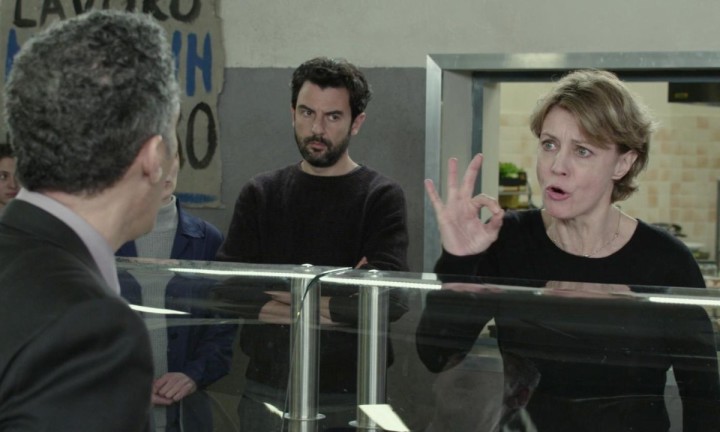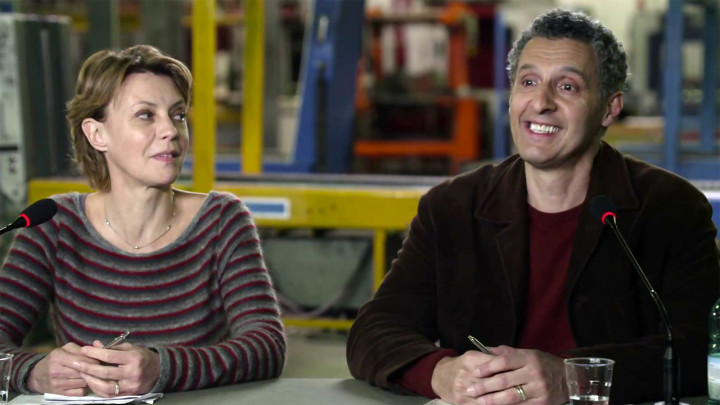Nanni Moretti’s Mia Madre is an intensely personal film in a distinctly Italian tradition. What Moretti achieves here is nothing short of remarkable — a multifaceted exploration of death, loss, work-life balance and the legacy we leave behind when we shuffle off this mortal coil. What’s really special about Moretti’s film is it deals with these lofty ideas directly and honestly while avoiding the pitfalls of self-important solipsism that so often beset lesser films.
Like last month’s The Hollars, Mia Madre is a dramedy dealing with the impending mortality of a much-loved matriarch. Unlike The Hollars, Mia Madre is a very good film. The story is deceptively simple; an overworked director tries to care for her dying mother as her personal life falls apart and the film she’s shooting inexorably goes off the rails. But the poignancy underlying this premise comes from a very real place, as this is essentially a gender-reversed autobiographical recounting of Moretti’s internal landscape in the wake of his own mother’s death during the filming of his last picture, 2011’s Palme d’Or nominee We Have a Pope. Moretti builds pathos with a subtlety that precludes saccharinity, delivering a profoundly affective and complex emotional range through a superficially straightforward narrative.
Moretti’s direction is masterful without being flashy, constantly finding small moments in which to establish character and context. His seamless use of naturalistic dream sequences, redolent of a more subdued take on Fellini’s fantasies in 8 1/2 (1963), gives these scenes equal prominence with the film’s objective reality. By forgoing the delineation provided by transitional editing techniques, Moretti encourages the audience to accept his protagonist’s psychological experience as being every bit as real and relevant as the more literal events of the narrative.
Moretti is able to insert these intimately personal statements without coming across as contrived or self-serving by undercutting the movie’s more maudlin moments with a generous sense of humor. Much of the comedy in the film comes from John Turturro playing a difficult American actor called in for a leading role in the movie’s film-within-the-film. Turturro’s performance is broad without digressing into hamminess, providing a perfect counterpoint to the film’s more contemplative aspects. The director himself also provides a contrapuntal comedic perspective as the protagonist’s work-averse brother, a role that may represent something of an escapist wish-fulfillment statement in contrast to his obvious autobiographical stand-in portrayed by frequent collaborator Margherita Buy.
As Moretti’s proxy in the film, Buy delivers a standout performance in one of the most nuanced and well-rounded roles a leading woman could ask for. The script, co-written by Moretti, allows Buy’s character room to breathe as a fully realized human being, flawed and competent in equal measure. Her capacity for authoritative command on the film set is offset by the challenges that plague her personal life, and she embodies this dichotomy with grace and charm. The audience can’t help but sympathize with her frustrated rage over Turturro’s incessant line-flubbing and terrible Italian pronunciation, and when she harangues a sadistic director of photograph it’s every bit as believable as her emotional breakdown over the inability to find her mother’s electric bill for a pushy salesman. In the hands of a lesser actress, the breadth of this spectrum would likely have led to an incongruous disparity of emotional registers, but Buy pulls it off admirably.
Moretti’s mise en abîme represents a metatextual statement above and beyond the usual, as Buy’s character is shooting a political melodrama focused on striking workers at a factory, a scenario reminiscent of the real-life director’s heavily leftist early films. This additional layer of complexity in an already multifarious autobiographical statement is indicative of what works about Mia Madre as a cinematic whole. Moretti has accomplished a seemingly Sisyphean task, juggling thematic elements ranging from the meaning and value of artistic work to familial relationships and the pervasiveness of regret, all without shortchanging his characters or story. Few films in recent memory have been as heartfelt or impactful as Mia Madre, though not for lack of trying. There has certainly never been a shortage of films trying to engage with the weighty emotional topics this film tackles, but such works typically deliver either significance or entertainment — seldom both. What really distinguishes Mia Madre from other films laboring under similar aspirations is it manages to be pretty damned fun in the process. Rated R for language.
Opens Friday at Fine Arts Theatre










Before you comment
The comments section is here to provide a platform for civil dialogue on the issues we face together as a local community. Xpress is committed to offering this platform for all voices, but when the tone of the discussion gets nasty or strays off topic, we believe many people choose not to participate. Xpress editors are determined to moderate comments to ensure a constructive interchange is maintained. All comments judged not to be in keeping with the spirit of civil discourse will be removed and repeat violators will be banned. See here for our terms of service. Thank you for being part of this effort to promote respectful discussion.